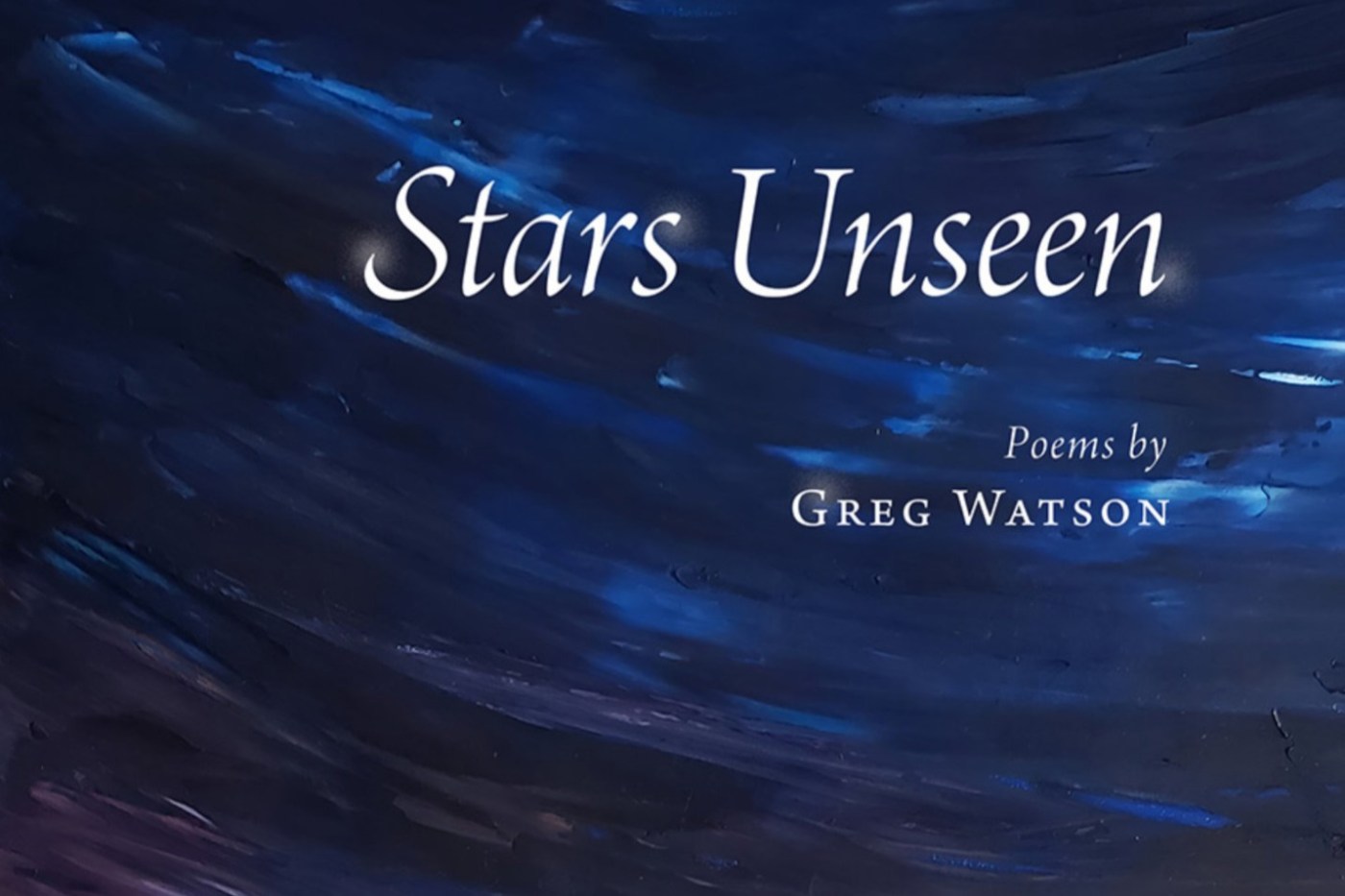
Readers and writers: Poetry and memoir, plus some mystery
Poetry. Paris. A variety of mystery/crime novels. We’ve got it all today.
(Courtesy of Holy Cow! Press)
“Stars Unseen”: by Greg Watson (Holy Cow! Press, $16.95)
It couldn’t have been much, whatever/could be tossed into two plastic garbage bags/and carried, from the station wagon/to the front porch of our new foster home. — from “Stars Unseen”
Greg Watson (Courtesy of Holy Cow! Press)
St. Paulite Greg Watson’s poem “What We Carried With Us” is one of several in his new collection that harks back to his difficult childhood, including a disturbed mother, a missing father, a stepfather who abused him, and always moving when the rent was raised, unless he and his brother were in foster care. And then there’s the scary grandfather who left prison to come home to die. He recalls stories of how a grandfather lost a finger and how farmers looked as they carried a coffin. Many of the poems pay tribute, in one way or another, to his Finnish ancestors.
Watson’s hardship memories lead to a through-line in the collection — his determination to make his daughter feel safe and loved. “I never wanted for you, dearest daughter,/to be anything other than the beautiful and sensitive/soul you have always been.”
Watson, who began writing poetry as a coping mechanism (why he did so is clear in the book), has released nine full-length poetry titles and three chapbooks. He is also celebrating publication of another collection, “The Days Between,” in which he spends time with his lost brother, his losses, his memories of different kinds and qualities of love. Published by Utah-based Kelsay Books.
Watson will introduce his books at 7 p.m. Tuesday at SubText Books, 6 W. Fifth St., St. Paul, with Michael Kleber-Diggs and William Reichard, and at 7 p.m. Oct. 1, Eat My Words Bookstore, 214 13th Ave. N.E., Mpls., with Dralandra Larkins.
“Paris Lost & Found”: by Scott Dominic Carpenter (Travelers’ Tales/Solas House, $16.99)
Carpenter, who lives in St. Paul, delighted readers with “French Like Moi,” a look at a Midwestern guy living in Paris away from the tourist area. Now this teacher of French literature and creative writing at Carleton College returns with a second adventure among the Parisians. But this one has a sad part, too, because the author was watching his wife Anne slip into memory loss, no longer recognizing the places they’d lived near for years. That’s why it’s subtitled “A Memoir of Love.”
Readers are immediately plunged into high drama at Carpenter’s apartment building where human feces have been found in the trash area. Inspecting the offending pile for length and color, consensus is that it is, indeed, a human turd. So the building’s resident council must be convened.
“I grumble along with the rest of them, doing my best to sound irritated,” he writes. “The fact is, though, that I live for the conseil syndical. For someone as enamored as I am of petty dramas, the committee is the goose that lays the golden eggs. Every month a new dilemma would plop out of the cloaca of the conseil syndical and we’d be charged with figuring out who had made unauthorized modifications, who left personal effects in the common spaces, who was lagging in payment of their fees and what to do about it all. Each one had the contours of a story.”
Scott Dominic Carpenter (Courtesy of the author)
Carpenter takes us to the egalitarian metro, “blind to class, race, and privilege… Part Noah’s Ark, part Ship of fools.” After Anne’s death and the pandemic loosened, Carpenter returned to Paris to find it a ghost town. Business were closed because of COVID, some for good. His longtime friends had moved to other parts of the country and weren’t coming back. Yet he found a life alone in the city he loved, from the sounds of the cranking of the giant dough hooks in the building’s bakery to “drawing nourishment” from people he had never met. There was also the dreaded dating.
Carpenter will introduce his book at 7 p.m. Thursday in conversation with Pilar Gerasimo at Magers & Quinn, 3038 Hennepin Ave. S., Mpls.
Mysteries
The crime/mystery genre has lots of branches. Here are three of them.
(Courtesy of Blackstone Publishing)
“Break Every Rule”: by Brian Freeman (Black Stone Publishing, $27.99)
There was only one thing for him to do. He had to find them. He had to rescue them. And the only way that could happen was for Tommy to go back to a part of his life he’d thought was over.
He had to become Tiger again. — from “Break Every Rule”
Freeman is a bestselling author who writes the Robert Ludlum Jason Bourne series. But this former Minnesotan, who began his career here, also writes exciting standalone thrillers like “Break Every Rule.”
Tommy is a man with deadly skills living in Florida under an assumed name with his wife, Teresa, and their baby daughter. When mother and child are snatched outside Teresa’s shop, Tommy knows he has to go back to undercover work he was trying to forget. Question is — who was he working for? Is it a group of renegades headed by a senator who have decided that the machinery of government doesn’t work? Are they patriots or traitors? When Tommy was Tiger, he broke rules for them and now he has to break every rule to get his family back.
There are echoes of real-life events here, including an island owned by a wealthy man where young girls come and go and where a member of Britain’s royal family is killed. (Think Jeffrey Epstein and Prince Andrew, who is still alive.) The man’s daughter, Malia, never thought much about where the girls went, because she was shielded from any sexual activity in the secluded cabanas. But then she begins to wonder. Police detective Lindy looks into the girls’ disappearance and follows Tommy to the Bahamas. We learn why Tommy is living under an assumed name and that his wife also had secrets.
Freeman, who lives in Florida, gives us a fast-paced plot, a protagonist we can root for, and a “ripped from the headlines” vibe.
And here are two from opposite ends of the spectrum. Laura Childs’ latest, “Peach Tea Smash” (Berkley Prime Crime, $29), finds Charleston, S.C., tea shop owner Theodosia trying to figure out if the Mad Hatter killed a banker at a masquerade party. She’s aided, as usual, by Drayton, her friend and the shop’s courtly tea master. Between sleuthing she hosts special events at her shop, including Book Lovers and Regency teas. It’s good to be back in Childs’ cozy world of candles, pretty china and tea sandwiches. With an occasional murder.
And then there’s ‘Look What You Made Me Do” by Brainerd-based Joe Prosit. Subtitled “A psychological slasher horror novel,” it’s about a woman who is menaced during the day by several men and at night by nightmares. What is real? What is a hallucination? What is a memory? This story would work fine as a thriller without the gore, but the cover tells you what you are getting here, so if that’s your thing… enjoy.
Related Articles
Literary calendar for week of Sept. 15
This California mom wrote the book on raising future voters
Mastering the game: Wilbur Ross on power, profit and perseverance
In ‘You Must Stand Up,’ Amanda Becker captures the scramble after Dobbs
Author Kao Kalia Yang to debut new book at St. Paul’s Battle Creek Middle School


